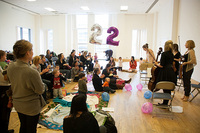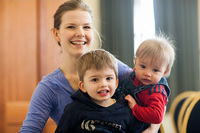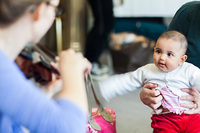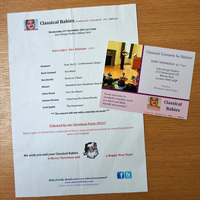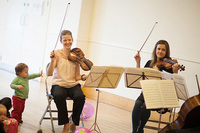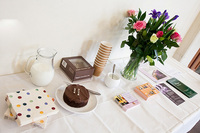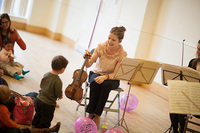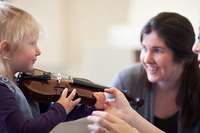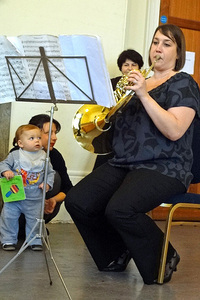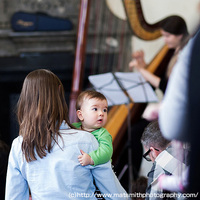English
The second example of baby concerts is ‘Classical Babies’. Compared to the first example, Wigmore Hall’s baby events, whose ethos is ‘to take mums and babies to a top-class concert hall’, the motto of Classical Babies is ‘to bring concerts to mums’ everyday lives’. At the moment, a variety of chamber music concerts are held every month in a mums-friendly space at eight venues, in London and surrounding areas. How does professional violinist Antonia Azoitei operate Classical Babies?
- Name:
- Classical Babies
- Director:
- Antonia Azoitei, violinist
- Venues::
-
8 venues in London and surrounding areas and in Manchester (as of June 2014)
St. Peter’s Church(Belsize Park/London),The O2 Centre(Finchley Road/London),
Childs Hill(Finchley Road/London: director’s home salon),
Landmark Arts Centre(Teddington/ Surrey),
Waterhouse Café (Kingswood /Surrey),
St Martin of Tours Church Hall(Epsom /Surrey),
Harpenden Musicale(Harpenden /Hertfordshire)
St. James' Church (Didsbury/Manchester) - Target:
- Babies and toddlers aged 0-3 and their parents or carers, and expectant mothers
- Time and date:
- 11:00 on weekday mornings, monthly, which includes a 40-minute concert followed by ‘Come & Try’, an opportunity to experiment with some mini instruments
- Fee:
- £10 per adult, babies and toddlers are free. Booking is recommended at some venues.
- URL:
- http://www.classicalbabies.com/
Antonia used to be a full-time professional violinist at the BBC Concert Orchestra, which performs a wide range of music, including classical and popular music, on various occasions such as the BBC Proms; and on BBC radio. After getting married to violinist Remus Azoitei, a professor at the Royal Academy of Music, she worked as freelance violinist. I interviewed her about how she started Classical Babies.
- What made you think of the idea of Classical Babies?
‘I used to play the violin every day when I was pregnant. It was really amazing because I could feel the way he was reacting to different types of music inside me, and I could always tell whether he liked it or not, which really got me thinking about babies and music even before I had him. After the birth, I was really missing playing music - so I played the violin and sang the piano part of Mozart’s piano concerto along with the CD to him. Sometimes he went crazy and other times he fell asleep, and I loved watching his face and different reactions to different music. I wanted other people’s children to have the same thing.
- Then how did you start it?
'I invited some mums who I met at NCT and yoga into my living room and I asked my string quartet to play for them, while the mums sat down and had a cup of tea, with their babies lying beside them. The mums didn't have to worry about their babies and both mums and babies were enjoying the music in a relaxed environment. It was fantastic! I always think raising a child is such a wonderful job to do and I love to do it, but at the same time, we miss out on such kinds of wonderful culture. So I thought of giving a concert at larger space to invite other mums. That was in 2010.
Then, I booked a hall at a shopping centre near my house called the O2 Centre, and did exactly the same thing. It was really an open space with a wooden floor. I tried to recreate my living room concert there. I was very nervous and only expected a few people as I had just handed out home-made flyers with my son's picture on them, but it turned out that we had 20-30 pairs at our first concert. I couldn't believe it!
I started to give a concert once a month at the O2 Centre, but sometimes it was overcrowded with up to 60 pairs (more than 120 people including the babies!) and it was too noisy! So I booked another venue in Belsize Park, and started to hold it once a week at two venues. Afterwards, some of the musicians made an offer to host one once a month, like franchising, and now the concerts are all monthly. There are eight venues in London and surrounding areas and in Manchester as well.'
- Are you running 'Classical Babies' full time now?
'At the moment, I run Classical Babies myself twice a week, and I go to the other venues sometimes either to perform or see how they are getting on. I also work for BBC Orchestra twice a week, and all other time is filled with violin lessons, managing and preparing Classical Babies, and parenting. Now my two sons go to nursery, but when they were babies, I used to bring them to Classical Babies and sometimes I had to shout 'Please wait for five minutes!' so I could feed my baby before starting a concert!'
The venues of Classical Babies are not usual classical concert halls with a high stage and fixed chairs, but are more open spaces such as church halls and halls at shopping centres, or cafes. Basically, there are no barriers between the players and the audience, and the front area of the flat floor is filled with soft mats, and then there are movable chairs behind, and there is also an open space for pushchairs at the rear. Babies can sit or lie down on a soft mat, playing with toys and books while listening to the music and watching the musicians play in their own style. Adults can sit and relax with their babies on the mat, or sit on a chair rocking them in their arms or breastfeeding them while listening to the music. Even if the baby is asleep, they can bring their pushchairs inside the hall and let the baby sleep while being rocked to the music. The concert respects the babies' everyday routine, and they can keep to this during the concert. Antonia told me the intention for this.
- What kind of environment are you creating inside the venues?
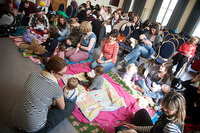 (c)http://www.matsmithphotography.com/
Listen to the music anywhere you like.
(c)http://www.matsmithphotography.com/
Listen to the music anywhere you like.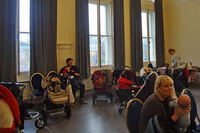
Buggy park at the back of the hall
'I wanted to create a concert hall space that works for the mums and bring it to their everyday lives rather than take mums and babies to the concert halls. I wanted to give a concert in a relaxed and familiar environment for the mums without having them go to a faraway concert hall all dressed-up, and looking up to a stage being stuck in a seat.
For that, they key points are: to create soft flooring on which to put the babies safely; to create a relaxed and enjoyable space for the babies where they can reach soft toys; to create a relaxed environment for the mums to enjoy music while having coffee and cake; to create an accessible space where you can move easily whenever and wherever you like; and to let the mums bring their pushchairs inside the venue. I thought it was important to have pushchair access, as the mums may want to come to the concert while the babies are asleep, and they need somewhere to put the babies down as holding a baby throughout a concert is too tiring. I thought hard to create a concert hall space as mum-friendly as possible, rather than putting mums and babies in a framework of an established concert hall.'
Looking back to when I went to the Classical Babies concert myself, it was quite helpful to be able to go inside the venue with my baby sleeping in a pushchair, and to be able to let him play on the mat during the concert. You don't have to make a special effort to adjust your baby's routine for a once-a-year occasion, instead you can go to a concert with your baby just the way he is every day. That means you can go to a concert every week, every month, anytime you like whatever your baby's routine. If you can go to the concert every week, you can try various ways of enjoying the music with your baby according to the baby's mood: you can actively dance to the music when your baby is happy; or you can concentrate on listening to the music when your baby is asleep. The atmosphere is so intimate that you can enjoy chatting with other parents and musicians as well over coffee before and after the concert.
- How do you find musicians for 'Classical Babies'?
'They are all professional musicians. I already had thousands of contacts of musicians through music college, orchestras and other musical activities, and there are always recommendations from friends, so I don't have any trouble finding musicians. Of course, there are many musicians who think this is a fantastic idea, and some musicians come and try out their repertoire in front of the babies before a big event, but in fact, there are also a lot of "musician mums" who are very keen and send me emails to say that, although they cannot work full time after becoming a mum, just like me, they want to keep playing in concerts. They don't want to lose touch with their instrument during their maternity leave. This is an ideal opportunity for them. Sometimes we practise our repertoire with our children popping their head out between our legs. It took me some time to get used to being both a mum and a musician, but now, I'm very happy about the way I work as I have plenty of opportunity to play music and I can work from home.'
- There are a variety of musical instruments appearing each time.
'I try to include different kinds of musical instruments each time. There are most of the orchestra instruments, piano, marimba and drums, but above all, harps are popular with babies and adults. They also love songs. We don't use brass instruments so much as they tend to be too loud especially in small venues where performers and babies are so close. Also, there are not so many baby-friendly repertoires that could fill a whole concert, so when we use brass instruments, we choose the horn, and have it played together with another instrument in a concert. Obviously I play the violin solo, duo and in a quartet, but I don't play every week. Sometimes I play at some venue every week, and sometimes I don't play for a whole month.'
Classical Babies concerts are 40 minutes of chamber music, including talks by Antonia and other musicians between pieces. These talks by "musician mums" are not an ordinary introduction to each piece, instead they talk about music from a mother's point of view. For example, they predict how the babies will react when they listen to the next piece, and they talk about an episode that happened when they played it to the babies before, so the audience can relate to the musicians and enjoy their baby's reaction to the music. Its talking style is witty "mum-to-mum" talk rather than "mum-to-baby" talk, so there are always smiles from both the audience and performers.
Before coming to a concert for the first time, most parents in the audience might well have been rather dubious about whether their baby can actually listen to the music, and whether the parents can enjoy themselves. Antonia discusses these concerns in the Q&A on the website.
'So the kids actually sit still and listen then, really...?!
This was a genuine question on Twitter from one disbelieving dad, before he came to see it with his own eyes. As we told him, the whole point of our concerts is that the children don't have to keep still, but YES they really do listen! Our favourite thing about playing concerts for babies and toddlers is that they are the most honest audience. They don't know they're "supposed" to sit and clap to be polite - the music either grabs them or it doesn't!
If the music soothes them, they lie down or cuddle mum or dad; if it gets them excited, we let them dance! Bounce them up and down on your knee, twirl them around to a Chopin piano waltz until they giggle or let them jump up and down...! You will be amazed at how often they just sit still, entranced by the musicians. It's amazing to see.'
After being entranced by the music, anyone who becomes curious about the instruments can have a go - touching or playing a little violin, or playing piano in the hall for a while.
- Why did you decide to add instrument tryout corner at the end?
'About a year and a half after I started Classical Babies, my husband had the great idea of introducing a little violin at the end of each concert, so I got a teeny-tiny violin out at the end of the concert and let the children have a try. It was the start of 'Come & Try' corner and it just went so well. And what happened was, a lot of children who had started coming to the concert from when they were quite little, and after having seen us play every week for over a year, when they hit two and half, they suddenly started to ask to play. They just had a go for a few minutes each time but their absorbing ability and coordinating skills were surprisingly high, and some of them were so persistent about having a proper lesson that I ended up teaching some of them. That's something I didn't expect. I always thought three years old is too young to have violin lessons, but through this Is realized how much those little children can understand and how coordinated they can be. Before they know it's meant to be difficult, their brain doesn't find it difficult, so they can actually play difficult phrases easily.'
When my son tried a little violin before he started to walk, he was curious about where the sound came from. So he turned the instrument upside down and put his cheek against the back plate and felt the vibration.
- How do you devise the programmes of each concert?
'Each time, I bring in a different theme in a different composition of instruments. I propose a theme and discuss the repertoire with the musicians. The themes are, for example, spring, dance, classic, romantic, jazz and movies. I show some paintings for the French Impressionism theme to combine arts and music. The concerts have been held weekly at some venues until recently, and most of the audience come every time, so I always try to make changes - being serious this week and energetic the next, for example - and try not to bore the regular audience.
You need to have a 'flow' in the programme. If you squeeze in short pieces in a programme with a serious long piece just in the interest of time, it won't work. I have to think about the flow of the whole concert.'
- Do you feel babies have any musical preferences?
'One of the things I discovered since I started Classical Babies is that although people tend to associate babies with lullabies, it doesn't work for a concert! They don't listen and once so many children started to cry and run around that we actually had to stop playing. Babies are unbelievably sensitive to the minor key. We adults are so used to hearing it during our lives so, just as we learn to tune out a lot of white noise of traffic, we learnt to be less affected emotionally by the minor key. Babies cannot control their emotions yet, so they can be deeply affected emotionally by the minor chord. In a sense, it shows you how much music affects babies' emotions.
Babies love lively music; anything with a regular beat they can dance to or bounce to. However, I do put music in the minor key and calmer music in a concert because I'd like them to experience all kinds of music and emotions. I sandwich them in a programme but I'd be very careful about how much and where to put them.'
Considering that the target audience includes both babies and recent mothers, who may also be very emotionally sensitive, her choice is right for mothers as well.
- What is your philosophy in choosing musical pieces?
'Classical music is like a language. You have to get used to it before you understand it. Looking back to my younger myself, my musical taste has changed so much: I cannot stand some musical pieces anymore as I've heard them too much, and they are too simple for me now; but I used to love them a lot when I was young. So I spend a lot of time thinking back to when I started listening to classical music as a youngster, and I try to remember which pieces first appealed to me and why. I am also learning more about early childhood from my baby's reactions to the music.
Some say that babies can listen to any kind of music including contemporary music as they don't have any prejudice, but there are some kinds of music which you'll find interesting only after you build up an understanding of all sorts of music. There are a lot of different styles in contemporary music, so if you choose them carefully, you can find great pieces which are also right for children. Having said that, I like to throw in a wild card every now and then and play very contemporary music. Through getting used to a new language little by little, babies can branch out from there.
Just because you haven't heard of it, it doesn't mean you won't love it at all, and I don't want to spoon-feed people with only simple music. I think we have to keep it varied and give them challenge in a programme without dumbing down the level of music. "Popular" is not quite the right term for how to choose the right pieces. The audience doesn't have to know about the music beforehand. What is important is that you have to examine whether the music is harmonically understandable, if it does something emotionally that I think will appeal to them, and if it helps them to build up basic musical language to branch out in their own way from there. We also have to consider that different areas have different audiences and different tastes in music.
- What is your wish for Classical Babies?
'Classical music has a lot to offer to the well-balanced development of the brain; it involves artistic sense, reading, different language, mathematical rhythms, right-left coordination of hands and brain through playing, and so on. Even little babies who are not able to play can experience various emotions by listening to classical music, and it helps them to identify and express their own emotions and understand others' emotions, which builds a foundation to bond to other people. I don't wish for everyone to be a musician, but I wish for everyone to have access to music in everyday life. I am an ordinary mum just like any other mum, who just happens to play the violin. I want classical music to be something people can go and listen to in their local area, wearing jeans, without having to dress up and go to a posh place. I'd like it to be part of everybody's ordinary life by taking it into a completely normal environment.'
At home, I found I had more than 10 programme sheets from Classical Babies which I had collected in just over a year. I feel this really illustrates how much this series made me think that going to classical music concerts with a baby is not that difficult.
Report: Chigusa Futako


